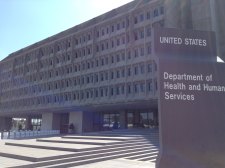CDC official says generative AI already saved agency workers 41,000 hours

As the Department of Health and Human Services begins offering ChatGPT to all of its workers, the Centers for Disease Control and Prevention’s acting AI chief is touting success with its existing work with the technology.
During a fireside chat at FedScoop’s FedTalks on Thursday, CDC’s acting chief AI official Travis Hoppe said the agency’s roughly 10,000 workers have logged 1.2 million chats with its existing generative AI offerings, saving workers an estimated 41,000 hours and contributing to a more than 500% return on the agency’s initial investment in the tech.
Hoppe said when he began as acting chief AI officer a few months ago, he wanted to review what work has actually been done with the tool, leading to the usage and ROI statistics. With that success in mind, Hoppe said it’s “exciting” to see HHS now deploying ChatGPT at the department level.
His remarks come just over a week after the department rolled ChatGPT out to all of its workers, becoming the first agency to take advantage of a deal cut by the General Services Administration to buy that technology for $1. According to a Sept. 9 internal HHS email, reported first by FedScoop, workers were told the technology is a way to promote science, transparency, and good health — but also warned to be “skeptical” of outputs.
Long before that rollout, however, Hoppe said CDC was the first federal agency to make ChatGPT available for all of its workers back in 2023. It also wrote the first generative AI guidance and shared it with other agency partners such as the Department of Commerce and Office of Personnel Management, the latter of which used it as a model.
Now CDC is poised to report twice as many AI use cases as it did the previous year in the annual public inventories of that technology expected later this year.
“Last year, for the AI use case inventory, which is public, we had about 50 submissions in that,” Hoppe said. “This year, we’re expected to be about double of that.”
Existing use cases include a tool called FluSight that looks at hospital data to inform decisions about when a flu might be coming. Meanwhile, TowerScout, another tool Hoppe referenced, is a computer vision project looking at satellite imagery to detect where there might be a Legionnaires disease outbreak by looking for cooling towers — which can be sources for the bacteria.
Hoppe also underscored the importance of data with AI, pointing to the agency’s 1CDC data platform — an effort to unify data and move away from so-called “data silos.” AI needs core work on things like data modernization and interoperability, he said. The 1CDC platform “is the way we will get to do all the fun AI projects,” Hoppe said.






